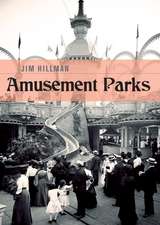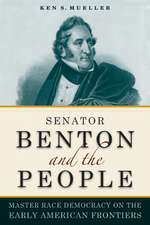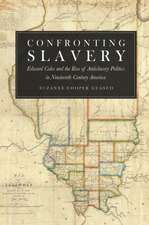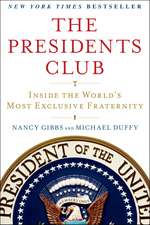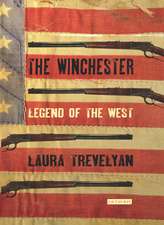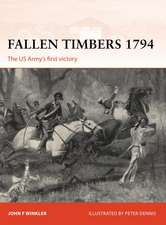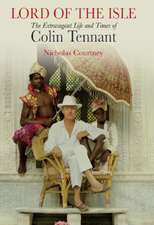Soldiering with Sherman: The Civil War Letters of George F. Cram
Editat de Jennifer Cain Bohrnstedten Limba Engleză Hardback – 16 aug 2000
Rare among Civil War correspondence, the collection of Union Sergeant George F. Cram's letters reveals an educated young man's experiences as part of Sherman's army. Advancing through the Confederacy with the 105th Illinois Infantry Regiment, Cram engaged in a number of key conflicts, such as Resaca, Peachtree Creek, Kennesaw, and Sherman's "march to the sea."
A highly literate college student who carried a copy of Shakespeare in his knapsack, Cram wrote candid letters that convey insights into the social dimensions of America's Civil War. With a piercing objectivity, optimism, and a dry sense of humor, Cram conscientiously reported the details of camp life. His vivid depictions of the campaigns throughout Alabama, Georgia, and the Carolinas contribute new insights into the battle scenes and key Union leaders.
Cram and several of his compatriots adhered to a principled code of personal conduct (no smoking, swearing, drinking, or gambling), striving to maintain integrity and honor in the face of war's hardships and temptations. Influenced by the abolitionist values of his community and college, Cram's observations on the effects of slavery and on the poverty of many of the Southerners are especially illuminating.
Civil War scholars and general readers alike will learn much from Cram's discoveries and observations—from his sympathy for poor whites to his grudging respect for the Confederates—that reveal the character of a young man maturing at war.
A highly literate college student who carried a copy of Shakespeare in his knapsack, Cram wrote candid letters that convey insights into the social dimensions of America's Civil War. With a piercing objectivity, optimism, and a dry sense of humor, Cram conscientiously reported the details of camp life. His vivid depictions of the campaigns throughout Alabama, Georgia, and the Carolinas contribute new insights into the battle scenes and key Union leaders.
Cram and several of his compatriots adhered to a principled code of personal conduct (no smoking, swearing, drinking, or gambling), striving to maintain integrity and honor in the face of war's hardships and temptations. Influenced by the abolitionist values of his community and college, Cram's observations on the effects of slavery and on the poverty of many of the Southerners are especially illuminating.
Civil War scholars and general readers alike will learn much from Cram's discoveries and observations—from his sympathy for poor whites to his grudging respect for the Confederates—that reveal the character of a young man maturing at war.
Preț: 345.25 lei
Nou
Puncte Express: 518
Preț estimativ în valută:
66.06€ • 69.17$ • 54.80£
66.06€ • 69.17$ • 54.80£
Carte tipărită la comandă
Livrare economică 10-24 aprilie
Preluare comenzi: 021 569.72.76
Specificații
ISBN-13: 9780875802619
ISBN-10: 0875802613
Pagini: 238
Dimensiuni: 152 x 229 x 23 mm
Greutate: 0.54 kg
Ediția:1
Editura: Northern Illinois University Press
Colecția Northern Illinois University Press
ISBN-10: 0875802613
Pagini: 238
Dimensiuni: 152 x 229 x 23 mm
Greutate: 0.54 kg
Ediția:1
Editura: Northern Illinois University Press
Colecția Northern Illinois University Press
Recenzii
"An important read for anyone interested in the Civil War."—Journal of Illinois History
"A rewarding and informative book.... Bohrnstedt has done a good job of introducing Cram to us as a complete, well-rounded human being, so we can more fully understand and appreciate his letters and his insight into his experience of war."—Civil War News
"A must-read."—Chicago Magazine
"A rewarding and informative book.... Bohrnstedt has done a good job of introducing Cram to us as a complete, well-rounded human being, so we can more fully understand and appreciate his letters and his insight into his experience of war."—Civil War News
"A must-read."—Chicago Magazine
Cuprins
Table of Contents
Introduction
1 "Citizens No Longer": Wyanet, July 9–Frankfort, October 20, 1862
2 "If You Examine the Map": Bowling Green, November 7–Scottsville, November 23, 1862
3 "The Gentlemen's Tent": Gallatin, November 30–South Tunnel, December 25, 1862
4 "Asleep in Jesus": South Tunnel, January 1–Gallatin, February 15, 1863
5 "I Would Prefer a Copy of Shakespeare": Gallatin, April 4–Nashville, October 10, 1863
6 "What Can't Be Cured Must Be Endured": Nashville, October 28, 1863–February 7, 1864
7 "The Big Brigade": Shelbyville, February 14–Lookout Valley, April 29, 1864
8 "It Was Every Man for Himself": Gordons Mills, May 3–Battlefield, June 19, 1864
9 "Perfect Terror": Marietta, June 25–near Atlanta, July 31, 1864
10 "The Very Air Seems Full of Death and Destruction": Near Atlanta, August 4–Atlanta, October 23, 1864
11 "Terrible Havoc Among the Citizens": Near Atlanta, October 30, 1864–Raleigh, April 19, 1865
12 "Extremely Well Paid for the Trip": Raleigh, April 28–Washington, D.C., June 1, 1865
Afterword
Appendix
Notes
Bibliography
Index
1 "Citizens No Longer": Wyanet, July 9–Frankfort, October 20, 1862
2 "If You Examine the Map": Bowling Green, November 7–Scottsville, November 23, 1862
3 "The Gentlemen's Tent": Gallatin, November 30–South Tunnel, December 25, 1862
4 "Asleep in Jesus": South Tunnel, January 1–Gallatin, February 15, 1863
5 "I Would Prefer a Copy of Shakespeare": Gallatin, April 4–Nashville, October 10, 1863
6 "What Can't Be Cured Must Be Endured": Nashville, October 28, 1863–February 7, 1864
7 "The Big Brigade": Shelbyville, February 14–Lookout Valley, April 29, 1864
8 "It Was Every Man for Himself": Gordons Mills, May 3–Battlefield, June 19, 1864
9 "Perfect Terror": Marietta, June 25–near Atlanta, July 31, 1864
10 "The Very Air Seems Full of Death and Destruction": Near Atlanta, August 4–Atlanta, October 23, 1864
11 "Terrible Havoc Among the Citizens": Near Atlanta, October 30, 1864–Raleigh, April 19, 1865
12 "Extremely Well Paid for the Trip": Raleigh, April 28–Washington, D.C., June 1, 1865
Afterword
Appendix
Notes
Bibliography
Index
Descriere
Rare among Civil War correspondence, the collection of Union Sergeant George F. Cram's letters reveals an educated young man's experiences as part of Sherman's army. Advancing through the Confederacy with the 105th Illinois Infantry Regiment, Cram engaged in a number of key conflicts, such as Resaca, Peachtree Creek, Kennesaw, and Sherman's "march to the sea."
A highly literate college student who carried a copy of Shakespeare in his knapsack, Cram wrote candid letters that convey insights into the social dimensions of America's Civil War. With a piercing objectivity, optimism, and a dry sense of humor, Cram conscientiously reported the details of camp life. His vivid depictions of the campaigns throughout Alabama, Georgia, and the Carolinas contribute new insights into the battle scenes and key Union leaders.
Cram and several of his compatriots adhered to a principled code of personal conduct (no smoking, swearing, drinking, or gambling), striving to maintain integrity and honor in the face of war's hardships and temptations. Influenced by the abolitionist values of his community and college, Cram's observations on the effects of slavery and on the poverty of many of the Southerners are especially illuminating.
Civil War scholars and general readers alike will learn much from Cram's discoveries and observations—from his sympathy for poor whites to his grudging respect for the Confederates—that reveal the character of a young man maturing at war.
A highly literate college student who carried a copy of Shakespeare in his knapsack, Cram wrote candid letters that convey insights into the social dimensions of America's Civil War. With a piercing objectivity, optimism, and a dry sense of humor, Cram conscientiously reported the details of camp life. His vivid depictions of the campaigns throughout Alabama, Georgia, and the Carolinas contribute new insights into the battle scenes and key Union leaders.
Cram and several of his compatriots adhered to a principled code of personal conduct (no smoking, swearing, drinking, or gambling), striving to maintain integrity and honor in the face of war's hardships and temptations. Influenced by the abolitionist values of his community and college, Cram's observations on the effects of slavery and on the poverty of many of the Southerners are especially illuminating.
Civil War scholars and general readers alike will learn much from Cram's discoveries and observations—from his sympathy for poor whites to his grudging respect for the Confederates—that reveal the character of a young man maturing at war.

